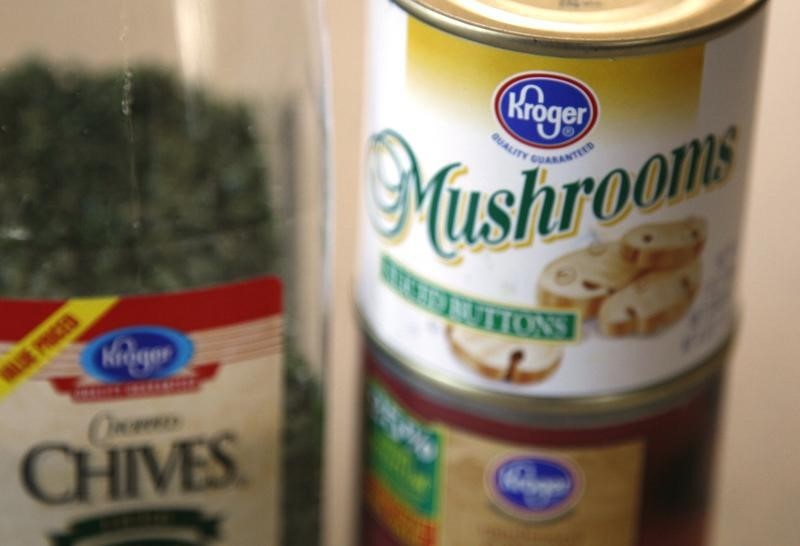By Jody Godoy and Aishwarya Venugopal
(Reuters) -Albertsons and Kroger (NYSE:) terminated their $25 billion merger plan on Wednesday after courts blocked the deal, with the previous suing its rival and alleging a breach of contract that led to the deal’s demise.
The formal termination ends a two-year effort by the chains to mix, which regulators argued would result in greater costs for buyers. Albertsons (NYSE:) stated it was suing attributable to Kroger’s failure to take “any and all actions” to get the deal authorised.
“Given the latest federal and state courtroom selections to dam our proposed merger with Kroger, we now have made the tough resolution to terminate the merger settlement,” Albertsons CEO Vivek Sankaran stated.
Albertsons is in search of billions of {dollars} in damages together with a $600 million termination payment.
Kroger known as the claims baseless in an announcement and stated it can defend in opposition to them in courtroom.
“That is clearly an try to deflect accountability following Kroger’s written notification of Albertsons’ a number of breaches of the settlement, and to hunt fee of the merger’s break payment, to which they don’t seem to be entitled,” a Kroger spokesperson stated.
Kroger stated on Wednesday that after reviewing choices, the grocery store chain has decided “it’s not in its greatest pursuits to pursue the merger”.
Albertsons operates round 2,300 shops and had alluded to the opportunity of retailer closures and layoffs if the deal was blocked. Nonetheless, the corporate sounded a optimistic observe on Wednesday, touting latest investments in new expertise.
Two totally different courts blocked the deal on Tuesday, siding with federal and state antitrust regulators, who moved to cease the deal by arguing that the merger would get rid of competitors between the standard grocery chains, inflicting greater costs and lowering leverage for unionized employees.
A mixed Kroger and Albertsons would have had the second greatest share within the U.S. grocery trade with about 11%, based mostly on 2023 trade market share info from GlobalData. Walmart (NYSE:) would have continued to carry the highest spot with about 17% of the market.
“Walmart, Costco (NASDAQ:) and different grocery giants are the clear winners on this situation,” stated Blake Droesch, analyst with eMarketer. “The merger would have created a formidable grocery competitor to Walmart. However with out the merger, Walmart stays in a league of its personal.”
The deal turned an emblem of surging grocery prices and confronted fierce regulatory opposition. U.S. meals costs have risen by 25% during the last 4 years, and whereas meals inflation is exhibiting indicators of cooling in 2024, grocery payments stay a priority for buyers.
The U.S. Federal Commerce Fee sued together with attorneys basic from eight states and the District of Columbia. Washington state sued by itself to dam the deal. In each of these circumstances, judges dominated on Tuesday that the deal would unlawfully lower competitors. Colorado had additionally sued to dam the deal.
Kroger defended the proposed mixture, saying it will convey costs down at Albertsons shops, the place it stated costs are 10-12% greater than its personal. The merged firm would fund value cuts via value financial savings it expects from a bigger operation, and a bigger buyer base to drive income for Kroger’s knowledge consulting enterprise.
The rulings in opposition to the deal are the results of Kroger’s unwillingness to take heed to regulators’ suggestions and to dump property that may have allowed deal clearance, Albertsons stated.
Had the deal proceeded, Kroger would personal roughly 5,000 shops throughout america. The businesses had argued at trial that promoting 579 of the shops, significantly in western U.S. states the place Kroger and Albertsons are situated close to one another, would protect competitors.
U.S. District Decide Adrienne Nelson, who oversaw the FTC case, disagreed, elevating doubts that the proposed purchaser of the shops, C&S Wholesale Grocers, may turn into a profitable competitor.
Albertsons claims that Kroger rejected stronger candidates for the sale.
A number of analysts had predicted a fast termination of the deal and stated that Kroger wouldn’t attraction the choice to dam the deal.
“We’re upset by the Court docket’s resolution, however not shocked, given the slender view of competitors adopted by the FTC and pushback and lawsuits from a number of state attorneys basic,” Telsey Advisory Group analysts stated after the deal was blocked.
Albertsons on Wednesday additionally stated it will bump its quarterly dividend as much as 15 cents a share from the present 12 cents a share, and it authorised $2 billion in share buybacks, although that features beforehand approved share repurchases.
Individually, Kroger additionally stated its board had authorised a brand new share repurchase program authorizing the buyback of as much as $7.5 billion of frequent inventory.
The brand new repurchase program replaces Kroger’s current $1 billion authorization, which was authorised in September 2022, the corporate stated, including that it intends to enter an accelerated share repurchase settlement of about $5 billion of frequent inventory.
Kroger shares have been up 2% in prolonged buying and selling after the buyback information. Albertsons inventory, which has fallen about 20% this 12 months, closed down 1.5% at $18.23 on Wednesday.

